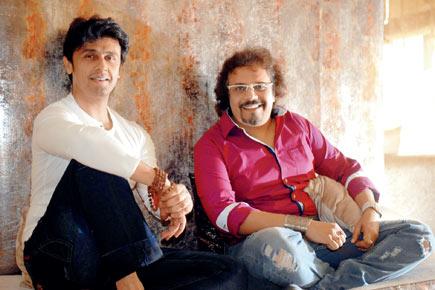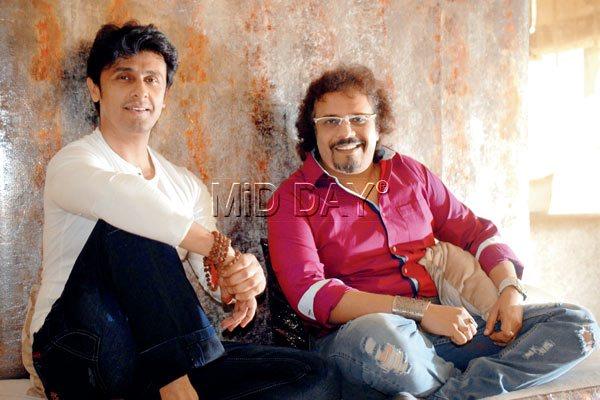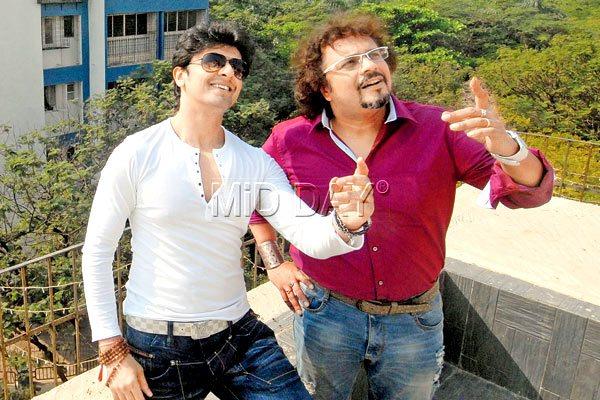Percussionist Bickram Ghosh and singer Sonu Nigam, who have been friends for five years, get along like a house on fire. The duo speaks about steering clear of clichés in their latest album, The Music Room, and the special bond they share

Sonu Nigam and Bickram Ghosh
We’re at Sonu Nigam’s house in Seven Bungalows, Andheri, where percussionist Bickram Ghosh is regaling me with behind-the-scene stories of the making of their album The Music Room, an album that’s as much mainstream, as it is experimental. Talking about how Nigam would prod him to give him beat structures he’s unfamiliar with, Ghosh says, “We have composed songs which are in three-and-a-half beats or four-and-a-half beats, which is very rare.” This would, in turn, make Nigam’s job of writing the lyrics even more challenging. “But you should listen to the lyrics he’s written. They will blow your mind,” the musician from Kolkata tells us. I remark that the two must have pushed each other’s boundaries, to which a deadpan Nigam says, “Push...pa!”, a la Rajesh Khanna in Kati Patang and Ghosh almost spills his tea as he guffaws aloud at the former’s comic timing.

Sonu Nigam and Bickram Ghosh at the former’s residence in Andheri. Pic/Sameer Markande
Open ground
It is probably this ability to switch off from work-related talk and delve into mundane matters, which helped the percussionist and the Mumbai-based singer form a bond. “A common friend from a music label introduced us. She insisted that we work together because we’re a lot like each other in terms of temperament,” Nigam says. Prod him further and he explains, “In this industry, we come across a lot of people who speak in cliches. So if you’re from the classical background, it will be ‘Wah janaab, kamaal kar diya’ and if you’re from Bollywood, it will be ‘Sir main hoon na, sir’. It’s hard to come across someone who is free from the cliches of this industry.” Ghosh agrees. “People tend to become prototypes and we have consciously stayed away from that. Sonu and I met each other on a very open ground. We chatted about our philosophies of life for almost three or four hours before we got down to doing some actual work,” he chuckles.

Sonu Nigam and Bickram Ghosh strike a comical pose on the terrace of the former’s house in Andheri. Pic/Sameer Markande
Adding layers
The two might have enough stories to share with each other, but it’s amazing how much work they can get done when it really matters. “All the seven songs in the album are the outcome of just one sitting,” Ghosh reveals, while Nigam adds that each time they met after that was only to layer those original seven songs further. The fact that they live in two different cities could have been a disadvantage, but the duo prefers to see it as a blessing in disguise. “His soul resides in Kolkata, while I live here in Mumbai. Maybe that’s good, as we bring in the best of both worlds,” says Nigam.
Work on the album began in 2010, so I wonder aloud why it took nearly five years for The Music Room to release. “We have been busy with composing music for movies, too. After Jal and Sooper Se Upar, we composed music for two upcoming movies, Happy Anniversary and the title song of Chauki,” Ghosh tells us. But the delay in the release of the album has only helped mature it, they feel. “Over these five years, we got to know each other and strengthen our friendship. And as we grew, we added more layers to the songs. Time has matured the album,” he adds.
The science behind music
The freedom to compose the kind of music they would like to — free from the strains of commercial factors — is what draws the duo to independent music. “I’m used to pre-decided situations, with the director coming up with an idea, the composer’s music and the lyricist’s words,” says Nigam, “Even with private albums, such as Deewana and Jaan we played it safe with soft, romantic numbers. But when you make independent music, you have to let the music be free.
You cannot have wings and drive on the highway. Bickram and I gave ourselves a lot of space to play around with, to come up with stuff we have never done before,” says Nigam. For instance, he tells us about a song, Khamakha, which is set to nine beats, one of the rare songs to be recorded in this rhythmic cycle.
“For the listener it’s a nice song, but for the connoisseur of music, there’s a science behind it,” he explains. Yes, there were times when they doubted their ability to compose such a song but ultimately, they went with their gut feeling. “We realised that we should be greater than the opportunity,” Ghosh says.
With camaraderie such as this, did they ever disagree with each other? “Yes, but then we would keep work aside and talk about other things. That helps clear our minds and the issue gets resolved on its own,” Nigam says, turning to look at Ghosh, who nodding his head, says, “Pushpa... I hate disagreements.” And this time, it’s me who almost spills the tea.
 Subscribe today by clicking the link and stay updated with the latest news!" Click here!
Subscribe today by clicking the link and stay updated with the latest news!" Click here!







